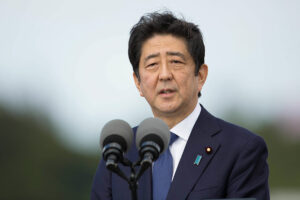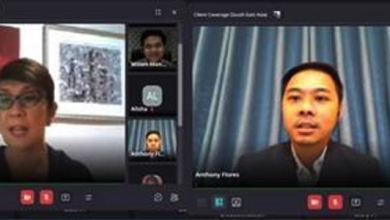Murder in Nara

PRIME MINISTER SHINZO ABE — ANTHONY QUINTANO -FLICKER
Japanese former Prime Minister Shinzo Abe’s death, on Friday, July 8, at the hands of a lone gunman on a street island that Abe had used as a platform to campaign for a candidate for parliament, was deeply troubling for a largely genteel city like Nara and country like Japan. Nara was the ancient capital of Japan in the 8th century.
Police apprehended a man, later identified as 41-year-old Tetsuya Yamagami, who witnesses said fired at Abe twice with the second shot proving to be fatal. Police confiscated a homemade shotgun which Yamagami, said to be a former Navy man and presently jobless, used to kill Abe. Journalists Safoshi Sugiyama and Chang Ran-Kim of Reuters reported TV network NHK as quoting Yamagami as having told police that “he was dissatisfied with Abe and wanted to kill him.” The suspect was reported to have told police that he had made multiple handmade explosives and guns in the past, according to NHK.
The act was immediately condemned by Japanese and international leaders, led by Japan’s Prime Minister Fumio Kishida and US President Joe Biden. An emotional Kishida, said to be a protégé of Abe, denounced the “attack as an act of brutality that happened during the elections — the very foundation of democracy — and is absolutely unforgivable.”
The shooting contradicted unique qualities of Japanese politics and society in general, where political violence and crimes committed with the use of guns are rare, and guns are tightly controlled. Sugiyama and Chang-Ran Kim report that the Abe killing was “the first of a sitting former Japanese leader since a 1936 coup attempt, when several figures, including two ex-premieres were assassinated.” The two journalists state that political violence is rare in post-war Japan. In 2007, the Mayor of Nagasaki was shot and killed by a yakuza gangster. The head of the Japan Socialist Party was assassinated during a speech in 1960 by a right-wing youth with a samurai short sword. A few other politicians were attacked but not injured.
The two writers added that “doctors were unable to revive Abe, who was taken to hospital in cardiopulmonary arrest and showing no vital signs. He was declared dead at 5:03 p.m., five hours after being shot.”
Shinzo Abe comes from a long line of Japanese politicians and public servants. The former prime minister had an extensive history of serving the Japanese government. He was a member of the House of Representatives starting in 1996, and became Chief Cabinet Secretary from 2005 to 2006. He was elected Prime Minister in 2006 but relinquished the position in 2007. He made a spectacular comeback in 2012 and resigned due to health reasons but only after many initiatives designed to restore Japan’s economy and global reputation. He pushed for and succeeded in getting Tokyo to host the 2020 Olympics which however failed to make the desired impact on the Japanese economy because of the COVID-19 pandemic. He believed in the power of the Indo-Pacific and spearheaded the Indo-Pacific alliance, which was an attempt to create solidarity among the democracies that surround the Indian and Pacific Oceans. The group is comprised of the US, Australia, India, and Japan. It was obviously an attempt to counterbalance the increasing influence of China in east Asia.
As Japan’s longest serving Prime Minister, Abe earned high marks from both Japanese and international observers. CNN writers Jesse Yeung, Rhea Mogul, and Helen Regan refer to these achievements when they cite an interview that Kazuo Suzuki, professor of public policy at Hokkaido University had with CNN’s Max Foster. In that conversation, Suzuki said that “Abe left a number of legacies in Japan and the world.” Suzuki emphasized that Abe “very successfully transformed Japan into a modern state fitting into this globalizing world… after the subprime crisis.” Suzuki added that the former prime minister “(helped the country recover from deflation) through Abenomics.”
“Abenomics are economic policies that have to do with increasing fiscal and monetary stimulus in the country through increased government spending and unconventional central bank policy, respectively.”
As a consequence of Abe’s assassination, some discussion was triggered about the nature of political assassination. It must however be noted that, based on reports and on statements of the suspect, Abe’s assassination may not be classified as a political assassination even if Abe was a prominent person who was murdered and the crime was executed by surprise. Yamagami reportedly said he was “dissatisfied with Abe and wanted to kill him.” It seems that there was no political motive in the sense that the elimination of Abe would directly benefit some candidate who was opposed to the candidate Abe was supporting. At least that is what it appears to be based on media reports.
On the other hand, the assassination of Ninoy Aquino, which the late Senator “Ka Pepe” Diokno called an “execution,” seems to have the elements of a political assassination. A Philippine court convicted, in September 1990, 16 people, including a number of military personnel, of murdering Ninoy Aquino on Aug. 21, 1983, at the Manila International Airport.
POLITICAL ASSASSINATIONSAs part of our reflection on political assassinations, we took a look at a paper of the Combating Terrorism Center of West Point entitled “The Rationale of Political Assassination,” written by Arie Perliger. Perliger is a professor and director of the graduate program in Security Studies at the School of Criminology and Justice at the University of Massachusetts. Our source document could therefore be considered an objective and balanced, neither tilting to the left nor to the right, presentation of professionals who are based in prestigious and credible institutions like the West Point and the University of Massachusetts, although Perliger’s views are his and do not necessarily reflect those of the Center, the US Military Academy, the Department of Justice and the US government.
The study used a comprehensive data set and employed quantitative analyses which we, unfortunately, cannot discuss in detail.
Among the observations presented in the paper are:
1. The number of (political assassinations) has risen dramatically since the 1970s, reflecting the emergence of new waves of terrorist groups, radical and universal ideologies operating on a global scale, and a growing willingness by oppressive regimes to use assassination as a tool in their treatment of political opposition.
2. The study also finds that in many cases, the perpetrators of political assassinations are the most experienced members of their group, and are government proxies.
3. Political assassinations are more probable in countries that suffer from a combination of restrictions on political competition and strong polarization and fragmentation.
4. The territorial fragmentation of a country is correlated with an increase in the number of assassinations.
There are quite a number of other interesting observations that are worthy of serious reflection. Most, if not all of them, have to do with supporting the democratic way of life.
Philip Ella Juico’s areas of interest include the protection and promotion of democracy, free markets, sustainable development, social responsibility and sports as a tool for social development. He obtained his doctorate in business at De La Salle University. Dr. Juico served as secretary of Agrarian Reform during the Corazon C. Aquino administration.




